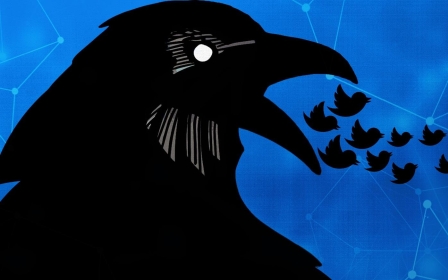Hillary Clinton emails: Why the Saudi-led disinformation network is recycling old news

On Sunday, the hashtag “Hillary’s emails” began trending in Arabic. Before long, it had accumulated tens of thousands of tweets and was the top trend in Saudi Arabia, racking up more than 170,000 tweets.
While the trend indicated that there had been a scoop or new leaks, it was in fact an attempt to repackage old news in order to mobilise public support in the Arab world against various enemies of Saudi Arabia and the UAE, including the Muslim Brotherhood, former Saudi Crown Prince Mohammed bin Nayef, and the Democratic Party ahead of the US election.
The fact that it was trending was initially unsurprising. US Secretary of State Mike Pompeo had recently promised to release more of former Democratic presidential candidate Hillary Clinton’s emails after Trump criticised him for not doing it sooner.
The analysis has been selectively interpreted to create a conspiracy in which Saudi Arabia is the victim of plotting by the US Democratic Party
Although the move has been roundly criticised as potentially illegal, Trump, amid poor poll numbers, has been desperate to replicate the political boost that former FBI director James Comey’s reopening of the investigation into the Clinton email scandal gave him immediately before his 2016 election victory.
But it soon became clear that the hashtag was not simply about Pompeo’s statement. Twitter users, mostly based in the UAE and Saudi Arabia, were behaving as if Pompeo had just released a sensational new tranche of Clinton’s emails.
Stay informed with MEE's newsletters
Sign up to get the latest alerts, insights and analysis, starting with Turkey Unpacked
In actuality, there was no new leak. The majority of the emails in question were legitimately and legally released in 2015 at Clinton’s request, amid an FBI investigation into her use of a private email server at home for government-related work.
Nonetheless, dozens of other verified Twitter users jumped on the bandwagon, discussing in a seemingly co-ordinated fashion selected emails. Many even used the term tasribaat (leaks) to further sensationalise the news.
Sattam Al Saud, a Saudi prince, wrongly claimed that the State Department had released 35,000 emails, implying this was a recent event, and suggested that the emails contained lots of interesting information pertaining to Saudi Arabia.
Dramatic caricatures
While much of the content being circulated is true, the analysis has been selectively interpreted to create a conspiracy in which Saudi Arabia is the victim of plotting by the US Democratic Party.
The Emirati news site Alain_4u was also heavily promoting the story, especially tropes claiming that the Muslim Brotherhood was set to bring down the Arab world with the help of Qatar and Turkey. In previous removals of fake accounts by Twitter, Alain_4u had been heavily promoted by inauthentic accounts, and has also faced accusations of spreading disinformation.
In addition to these tropes, Saudi accounts presented Clinton as not only colluding with Qatar, but also as being fundamentally anti-Saudi - a politician who wished to support the Arab uprisings in a way detrimental to the status quo.
Some argued that Clinton green-lit a news channel linked to the Muslim Brotherhood while colluding with Al Jazeera, which the UAE recently tried to censor by successfully lobbying to have it registered as a foreign agent in the US.
Cartoonists were quick to draw dramatic caricatures of Clinton, including one featuring her and a pile of money overseeing a man using a blood-covered laptop with the Al Jazeera logo on it.
The conspiracy theories also tied into more recent tropes, indicating that Clinton colluded with former CIA director John Brennan to elevate bin Nayef at the expense of Saudi Crown Prince Mohammed bin Salman. They also implicated in the conspiracy Saad al-Jabri, the former intelligence officer who recently filed a lawsuit alleging that bin Salman tried to have him murdered in Canada by the same team that killed Jamal Khashoggi.
Nefarious plotting
This was no doubt an attempt to damage Jabri’s reputation domestically to legitimise the collective punishment of his family, and to conveniently tie dissidents together under the same nefarious plot. Writing in the Washington Post, David Ignatius notes: “MBS’s supporters seem to be preparing for a possible trial of the deposed crown prince [bin Nayef] on treason and corruption charges.”
Dozens of verified influencers took up the message. UAE-owned Sky News Arabia, part of Sky News International, also ran the story as if it were a novel event, framing it as an example of an Obama-Clinton nexus of support for the Muslim Brotherhood.
Those spreading the sensationalised faux-scoop of Clinton's emails have established a modus operandi: circulate the story via influencers on Twitter until it 'breaks out' into established media
The disinformation campaign highlighted the complicity of reputable news channels in propagating misleading content. Indeed, Sky News Arabia has increasingly been involved in promoting doctored or misleading content. Last month, it removed the word “Palestine” from a poster in the background of an interview, replacing it with “Lebanon”.
Those spreading the sensationalised faux-scoop of Clinton’s emails have established a modus operandi: circulate the story via influencers on Twitter until it “breaks out” into established media.
Although this is designed to “simulate scandal”, the fact that so many news channels and influencers relentlessly pursued a five-year-old story illustrates the level of media coordination among superficially independent, but ultimately co-opted, entities and influencers.
The views expressed in this article belong to the author and do not necessarily reflect the editorial policy of Middle East Eye.
This article is available in French on Middle East Eye French edition.
Middle East Eye delivers independent and unrivalled coverage and analysis of the Middle East, North Africa and beyond. To learn more about republishing this content and the associated fees, please fill out this form. More about MEE can be found here.






